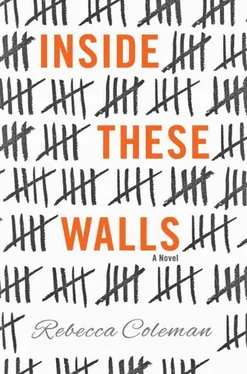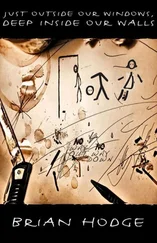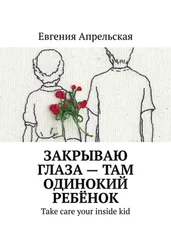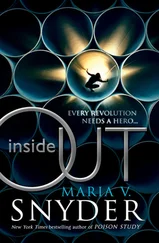“You don’t owe me anything at all.”
“Okay, fine. I want to help. I told my daughters about you.”
I smile and perk up. “You did? What did they say?”
He shakes his head, but he’s smiling too. “They think I’m crazy no matter what I do. That’s never going to change.”
“I don’t want them to hate me.”
“Because you’re a felon? They’d have to hate us both.” He leans in on his elbows, pressing close to the window. “Maybe God’ll work a miracle. I’ll pray for it.”
“Pray for one with my daughter, while you’re at it. She’s not speaking to me anymore.”
“She’ll come around.”
“I don’t know about that.”
“You’ll see. If you get out.” He nods, then lifts the corner of his mouth in an understanding smile. “She came to you looking for a sense of peace about her background. That’s never a straight road. She’ll be back.”
“Maybe you’re right. Thank you.”
“It’s probably heartbreaking in the meantime. It always is, when people leave.”
I nod ardently. It’s the truest thing I know, and he knows it too. He holds up his hand and presses it against the glass. I lift mine and fit it against his from the other side. And then, before I even realize it’s going to happen, I begin to cry. It starts with a shaking in my chest, then rises, and before I can control it I’m sobbing and sobbing, my face streaked and overheated, my breath coming in choking gasps. I have to hang up the phone, and the C.O. catches sight of me and comes over to remove me. They don’t allow scenes like this, and I can’t blame them. I don’t even look over my shoulder as they hustle me away.
* * *
I’ve been in my new cell for just over a week when a Saturday brings me my one permitted houseguest—Father Soriano has come to take my confession and offer me the Eucharist in these new surroundings. The C.O. opens the bars to let him in, and the priest looks around the small cell with a pitying gaze. “I’d like to ask what you did to get in here,” he begins, “but maybe that will be part of your confession.”
“Not mine, but maybe somebody else’s. I got attacked in the yard. Apparently some of the others felt my cellmate was starting to like me too much.”
He nods. With one finger he flicks the edge of a new piece of my décor—strips of toilet paper hung wherever I can attach them, each square torn most of the way apart but not entirely, to form a long banner of squares. On each bit of the thick, industrial paper I have drawn, in pencil, a Buddha or an ohm symbol, a lotus flower, or a wheel. They have allowed me my pastels, and so each image is smudged with careful strokes of color dampened just a bit with my saliva to create a watercolor effect. These are prayer flags, which I saw on a television show on PBS while I was in the hospital. The idea is that as they flap in the breeze, they carry prayers to the heavens, and the paper does indeed flap lightly when the air-conditioning vents come on. Each of my fingertips is a different shade of pink, blue, pale green or yellow, and the dyes are impervious to soap thus far.
“Very nice,” he says. “Festive.”
“I’m praying for the Chois. They were Buddhists.”
He takes a seat on my little stool. “I see. Well, how are you feeling? How’s your leg?”
“My leg is all right,” I say, but I dodge the larger question. In terms of isolation Med Seg is only a half-step above the Hole, and the past ten days have been a grueling trial. The lights never go off, the noise never quiets down, and yet the interaction with other inmates is virtually nonexistent. It’s the strange feeling of being suspended in a single endless moment, a skipping record that plays the same line of a song over and over. I begin to sleep a lot, using my cardigan sweater as a shield against the relentless fluorescent light; and in the hazy twilight just before sleep and at awakening, I come to understand exactly why Ricky felt the way he did on the day he killed himself. When his cousin Dan came to visit me years and years ago, suicide note in hand, he’d mentioned that Ricky had been in the Hole. Only now does it occur to me that he’d probably been in protective custody for months, perhaps the entire time. Ricky couldn’t even go an entire shift at the Circle K without getting jerked around by jocks two years younger than himself. I can only imagine what the showers must have been like at Chowchilla.
The priest waits a brief interval for me to expand on my answer, but I say nothing more. He lifts his eyebrows and asks his question. “Are you ready to begin your confession?”
“I have nothing.”
He smiles thinly. “Let’s go over an examination of conscience and determine whether that’s true.”
“Let me propose an idea to you, instead.”
He rests his hand on his thigh and looks at me curiously.
“I want to see my stepbrother. He’s done things to me that I can only forgive if I have clearer information. I know what you’re going to say—that I should forgive him simply on principle, to be Christlike. But unfortunately, I’m not Christ.”
The priest offers a spontaneous, indulgent smile. “None of us are, Clara. Go on.”
“I want you to reach out to him and get him to come here and talk to me. I don’t mean in those silly little visitation booths, either. I mean face to face.”
He gestures to the walls of the cell. “That’s never allowed in Medical Segregation.”
“But it’s allowed in the chapel, if you’re present. You could arrange that. He still lives in San Jose, as far as I know. I can give you the address, and maybe you can find a phone number based on that.”
His gaze shifts to the side, and I can tell he’s pondering the idea.
“Just listen,” I say, losing the strident voice he seems to dislike so much, and finding a softer tone instead. “It doesn’t have to go well. I don’t need him to be sorry, or to find a reason to excuse any of the things he did to me. I just want to look at his face and see how much time has passed. I want to see how old my wounds are. And I want to hear and see that at some point in his life, he was somehow vulnerable too. Because I can’t forgive a monster, but for my own peace of heart, I can forgive a human being. I need to see that he is one.”
At last he nods. “Well, I’ll try, Clara. The decision is up to him, but I’ll reach out, at least. That much I can do for you.”
* * *
I am lying on my narrow bed, attempting a bit of makeshift physical therapy, when NPR breaks to the news and announces the arrest of a Travis Goodman in connection with the Robbins shooting. I sit up so quickly that I feel lightheaded and hurriedly turn up the volume. Public records indicate that Goodman, of Charlestown, is the registered owner of a handgun of the type used in the shooting. More details are expected at a press conference later today.
Mona comes by a few hours later, guiding me into the small office at the end of the row of cells, her high cheekbones carved into vivid relief by her smile. “So you’ve heard the exciting news,” she says. “I’ve been calling the Attorney General’s office all day, hounding them. They’re doing the forensics tests tomorrow, and I’m hoping to press them for an answer as soon as that’s completed.”
“Is all of this based just off what I told you?”
“Yes and no. Goodman wasn’t even considered as a suspect before—why would he be?—but the information you gave them sent them looking at surveillance footage of gas stations and fast-food places in the area, and they spotted him. He also fits the description given by a witness who was collecting used golf balls in the woods around the time of the shooting. Your information is helping them fit it all together. This is very good, Clara. You should feel optimistic.”
Читать дальше









